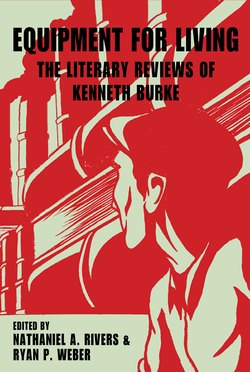Читать книгу Equipment for Living - Kenneth Burke - Страница 15
На сайте Литреса книга снята с продажи.
ОглавлениеTentative Proposal
The Mediterranean, and Other Poems by Allen Tate. Alcestis Press
Reactionary Essays on Poetry and Ideas by Allen Tate. Chas. Scribner’s Sons
Poetry, May 1937, 96–100
It has never been hard for me to understand why, in the face of too much talk about “progress,” one should say: “In that case, call me a reactionary.” Or why overzealous faith in scientific panaceas might make one even prefer to see a world go hang rather than see it happy by such dismal tests (observing, first, that the excess of zeal is fantastic in its credulousness; and second, not wanting comfort on such a plane even if it were obtainable). If, furthermore, one is a poet, and deeply so, as Mr. Tate is—and if one, with the scrupulosity of poets, has formed his expression around the coordinates of death, seeing everything, as it were, as a projection, or attentuation, of the mood one might feel when delivering, or hearing, a funeral oration—one will presumably have invested too thoroughly in an art that is at home with death for him to feel our current hygienic cant as other than a threat to his very character. That, too, I can understand. Or, on seeing what has been done with ambition in recent centuries, I can understand why one might want to speculate again on the sounder insight of humility.
But I can less well understand why such an earnest and discerning man would permit himself to “freeze” on these issues, to freeze too soon, thereby being forced to uphold tendencies that he need not uphold. I should cite Thomas Mann, who is as thorough as any contemporary writer, who sees how much more complex the problems of human relationship are than the coordinates of naïve materialistic science make them out to be, and who can pay tribute to the powers of darkness while warning against the powers of darkness.
Mr. Tate disturbs me. For he is exceptionally penetrating, both as critic and poet. To read his book of poems and his book of essays together, as I have just done, is to be stirred.
In my disturbance, I began looking for a quick solution. I began looking for some rule of thumb, as writers of reviews must, something handy, that might serve here as a point of departure. There is, of course, the ready availability of matters to do with “class.” There is the “cue” derivable from the statement: “The Negro, who has long been described as a responsibility, got everything from the white man.” One may stickle at the vandalism of that. But I am going to risk an even blunter formula, that could be associated with it, but might apply as well to men of much different views.
What I feel the lack of, throughout both essays and poems, is physicality. How much of a poet’s “soul,” I have often dared ask myself, stems from the simple fact that he doesn’t do enough, in the purely muscular sense of doing? While voicing great resentment of abstractions, Mr. Tate suggests something of the abstract and managerial in his notions of social and poetic purpose. There are those who lift and carry; there are those who oversee those who lift and carry; and there are those who, insofar as the processes of overseeing and being overseen are in order, may stand somewhat aside from both. Mr. Tate, as we clerics have ever been, seems sometimes the super-overseer and sometimes the forgetter, but too little of the physical mover.
Ethically, the cleavage tends toward a breach of this sort: Concepts of humility do not attain their counterpart in menial acts. They become truncated, somewhat of a soul without a body (as colonies or monastic orders were not). They become insignia. And the abstract is inevitable, since it is not grounded; it yearns for immediacy, without paying enough attention to the entrance into immediacy, which is through the body (i.e., “mimetic”). Do we not all tend to become too “efficient” in our function as “clerics” (a tendency permitted to some in every age, but often even drastically required of us today)? No purely contemplated South, I believe, no sanctioned and cherished ancestry, no refurbished feudalism however humane, even no “progressive” solution, can be the antidote to such abstraction. Our social drama must be reconstructed on the basis of the body as an actor. It is because of such beliefs that I call his statement about the Negro “vandalism” (vandalism is that which robs everyone).
From this rough-and-ready formulation, many attendant reservations might be deduced. Does not its violation account in great part for the forbidding rigor of his verse, its preference for granite rather than for litheness? The results are sometimes deeply impressive. His metaphysical “Shadow and Shade” is a poem that I shall return to often, both for what it says, and for what it gives inklings of, beyond the saying. And repeatedly, I find his remarks on other writers astounding in their incisiveness and imaginativeness. Yet, in both his critical perception and his poetic expression, I feel no preparatory cult and practice of doing. In politics, we get at most the vestiges of the managerial genius in such statesmen as Calhoun. In poetry with religious hankerings, we get austere purgatorial moods (forgetful that, whatever this world is, it is not wholly the disembodied state of purgatory).
His poetry, I should say, marks the reward of such selectivity. His technical criticism is its conceptual parallel in worth. And his social exhortations are its corresponding deficiency. They make him say “Faugh!” where he might have said “I’m sorry.” They make him say “Turn back” where he might have said, “Let’s try to go on, and come out on the other side.”
